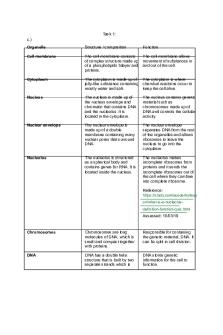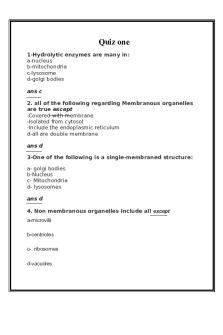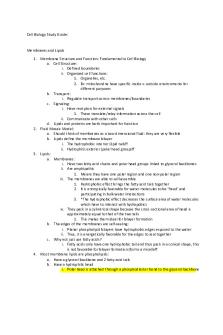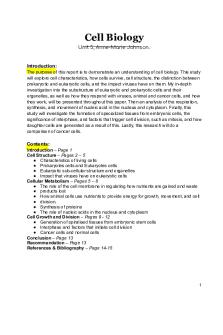Cell biology and genetics PDF

| Title | Cell biology and genetics |
|---|---|
| Author | Bilal El Chahrouk |
| Course | Cell Biology and Genetics |
| Institution | University of Technology Sydney |
| Pages | 12 |
| File Size | 256.1 KB |
| File Type | |
| Total Downloads | 76 |
| Total Views | 170 |
Summary
outloine...
Description
SUBJECT OUTLINE 91161 Cell Biology and Genetics Course area
UTS: Science
Delivery
Autumn 2018; City
Credit points 6cp Result type
Grade and marks
Attendance: 4.5hpw
Subject coordinator Dr. Kristine McGrath Phone: 9514 9773 Room: CB04.06.548 All inquiries/correspondence that are of a personal nature should be via email: [email protected] General inquiries about how the subject runs, the assessments and lecture content are to be posted on the UTSonline forum.
Subject description This subject provides an introduction to the basic concepts of cell biology with a focus on cell structure and function, biological molecules, genetic code and theories of inheritance. The subject aims to develop students' professional skills through the introduction of a range of basic laboratory, analytical and quantitative skills used to investigate the cell structure and the functional significance of their sub-cellular organisation. Students also learn how to utilise modern library resources to find and review published research literature, evaluate its content and significance, and create both written and oral presentations that can be used to communicate core scientific concepts. After completing this subject, students should be able to gather, evaluate and apply necessary information relevant to a scientific problem.
Subject learning objectives (SLOs) Upon successful completion of this subject students should be able to: 1. Describe and explain fundamental concepts of biomolecules, cell structure, cell cycle, cellular processes, genetics, and the importance of water to life. 2. Communicate, in oral and written formats, fundamental concepts of Cell Biology and Genetics in a clear and concise manner to a target audience with basic (high school) scientific knowledge. 3. Accurately follow experimental procedures (methods) to examine biomolecules in a laboratory setting. 4. Analyse scientific data (experimental and published writings) and come to the correct, reasoned conclusion. 5. Present scientific data in graphical, tabular and written formats. 6. Research a specific scientific topic relevant to Cell Biology and Genetics, including literature searches of published materials.
Course intended learning outcomes (CILOs) This subject also contributes specifically to the development of following course intended learning outcomes: An understanding of the nature, practice and application of the chosen science discipline. (1.0) Encompasses problem-solving, critical thinking and analysis attributes and an understanding of the scientific method of knowledge acquisition. (2.0) The ability to acquire, develop, employ and integrate a range of technical, practical and professional skills, in appropriate and ethical ways within a professional context, autonomously and collaboratively and across a range of disciplinary and professional areas, e.g. time management skills, personal organisation skills, teamwork skills,
27/02/2018 (Autumn 2018)
© University of Technology Sydney
Page 1 of 12
computing skills, laboratory skills, data handling, quantitative and graphical literacy skills. (3.0) An understanding of the different forms of communication - writing, reading, speaking, listening - including visual and graphical, within science and beyond and the ability to apply these appropriately and effectively for different audiences. (6.0)
Contribution to the development of graduate attributes Graduate Attribute 1 - Disciplinary knowledge and its appropriate application. An understanding of the nature, practice & application of the chosen science discipline. Fundamental disciplinary and technical knowledge in cellular biology and genetics will be gained from lectures, course texts and online materials and participation in practical exercises. This knowledge will be assessed both during the subject via quizzes and at the conclusion of the subject by a final formal exam. Graduate Attribute 2 - An Inquiry-oriented approach Encompasses problem-solving, critical thinking and analysis attributes, and an understanding of the scientific method knowledge acquisition. An appreciation of critical and independent thinking by objective criticism, logical thought and problem-solving that are considered to be the foundations of the scientific method will be gained by participation in a series of practicals that support learning of key cell biology and genetics concepts. This will be assessed by completion of worksheets for each practical. The gathering, evaluating and applying of information relevant to a scientific problem and an appreciation of the existence of different sources and types of information, such as peer-reviewed publications, databases, research and review articles, textbooks, catalogues and technical reference books will also contribute to the subject enquiry-orientated approach. This will be achieved by completion of and assessment of both an oral presentation and a mini poster assignment that will be supported by dedicated research skills workshops. Graduate Attribute 3 - Professional skills and their appropriate application The ability to acquire, develop, employ and integrate a range of technical, practical and professional skills, in appropriate and ethical ways within a professional context, autonomously and collaboratively and across a range of disciplinary and professional areas. e.g. Time management skills, personal organisation skills, teamwork skills, computing skills, laboratory skills, data handling, quantitative and graphical literacy skills. The application of numerical and analytical skills at a level appropriate to scientific practice for a stage 1 undergraduate student will support development of this graduate attribute. You will develop professional skills in a range of basic laboratory techniques and be assessed by completion of lab worksheets that include analysis of data, creation of tables & graphs and answering of specific questions related to the practicals. An understanding of the observational and experimental character of science and development of basic skills in field and laboratory techniques and experimental design will also constitute an integral part of the practicals with assessment being based on careful completion of the required protocols and accurate reporting of your outcomes in the laboratory worksheets. Management of workload required for scientific based practice and professional work will involve preparation for practicals and contributions to group based parts of the practicals. Assessment will be via several pre-practical preparation exercises and on your observed in-practical participation and contributions. Graduate Attribute 6 - Communication skills A fundamental understanding of the different forms of communication - writing, reading, speaking, listening, as well as, visual and graphical - within science and beyond and the ability to apply these appropriately and effectively for different audiences. A level of spoken and written communication skills in the presentation of scientific research and data commensurate with the expected foundation level of stage 1 undergraduate student will be gained by preparation of an oral and written assignment based on a published scientific article. Assessment will be based on clear presentation in both formats to academic staff and student peers.
27/02/2018 (Autumn 2018)
© University of Technology Sydney
Page 2 of 12
Teaching and learning strategies This subject adopts both teacher and student-led approaches to help you understand and apply the concepts of Cell Biology and Genetics. You will be encouraged to learn via a blended approach of attending face-to-face lectures (1.5 hrs per week) that will be complemented by extensive use of online resources, laboratory practicals (3 hrs per week) and participation in workshops/tutorial (varies). The subject delivery is 4.5 hours per week over 12 weeks of Autumn Session. Over the Session, you will have: Lectures: 1.5 hours per week x 11 weeks In this subject, you will learn the basic concepts of Cell Biology and Genetics through the attendance of face-to-face lectures. The lectures will provide you with the opportunity to quickly clarify complex descriptions, terminology, and engage with complicated topics. Approximately 50% of the face-to-face content of the course will be delivered as student-led enquiry. To this end, you will be required to use your time outside of the classroom to review and understand the week’s lecture content with materials provided on UTSOnline so that when you attend the lectures, you can put your learning to practice. You will also be required to engage in online learning modules (Mastering Biology) each week. These modules will involve self-administered mini quiz followed by direct online feedback on your performance with the opportunity to immediately review subject material needed for improved performance in a subsequent retesting. This will provide context for early and ongoing feedback. Laboratory Practical: 3 hours per week x 5 weeks You will be expected to attend and participate in 5 practical sessions each of 3 hrs duration. These sessions will occur in a technology integrated laboratory and involve experiments that develop practical laboratory skills and illustrate concepts of both qualitative and quantitative analysis in support of the lecture material. The practical exercises will based on experimental testing of biological materials, modelling of biological structures and process flows and a genetic simulation experiment. Laboratory-based exercised will incorporate both individual and small group based work (i.e. groups of 2-4 students). Research Workshop: 2 hour per week x 2 weeks Research Workshop 1 will be structured so that in the first half of the class you will pick your poster topic and learn how to search the literature to find the article you will present. Guided by a worksheet, you will identify the important information from the article and use this to create a poster of the article. You will also be provided with an instruction sheet and detailed marking rubric of the assignment to ensure you understand the outcomes required. Research Workshop 2 will expect you to come to class with your poster (and a copy of the article) and have this peer-reviewed by your fellow students. This peer-review will be facilitated by the teaching associates (TAs) and follow a developed worksheet that will give formative feedback to you. You will then be asked to self-reflect on this feedback by writing a one-paragraph under the given feedback, describing how the feedback can improve your work. TAs will acknowledge students who have doubts about the accuracy of the feedback given and will encourage any such students to research further, and come to their own evidence-based conclusions. In addition, online resources will be added to UTS Online to assist in your knowledge of scientific articles and how to create a scientific poster. You will give an oral presentation based on the scientific poster that you were guided to complete in the workshops towards the end of the session. UTSOnline The use of UTSOnline is integral to the subject and you are expected to login to CBG content regularly to receive information relating to scheduling, assessment tasks, lecture and laboratory times and locations, to participate in the online forums, quizzes, and to access online resources. You will also be able to access UTSOnline Discussion Board for CBG. All enquiries regarding the content of lectures/practicals should be posted in this discussion forum.
27/02/2018 (Autumn 2018)
© University of Technology Sydney
Page 3 of 12
Content (topics) The major topics covered in this subject are: 1. Cell structure and cellular processes including: Basic cell structure including organelles of eukaryotic and prokaryotic cells. Cell membrane transport Cellular communication Energy and metabolism Water and basic acid/base concepts as they relate to living organisms 2. Properties of Biomolecules including the structure, function and techniques for quantitative measurements of: Carbohydrate Protein Lipid Nucleic acid 3. Understanding of basic genetics including: Concept of genetic code, chemical structure and regulation through transcription and translation. Cell division (meiosis and mitosis), differentiation and cell cycle Theories of inheritance, including population genetics, evolutionary relationship and Mendelian and Non-Mendelian theories. Diseases pertaining to inherited diseases as well as diseases relating to gene expression or mutation.
Program Week/Session
Dates
Description
1
12 March
Preparatory Activity - Introducing Cell Biology and Genetics (Venue - Lecture theatre) Preparatory Activity - Introducing pipetting and common equipment (Venue Superlab) Other Activity - Watch subject orientation video on UTSOnline Mastering Biology: CompleteMastering Biology module. You need to access this through UTSonline Mastering Biology tool and complete the quiz that has been designed to reinforce your understanding of concepts learnt .
2
19 March
Lecture 1: Introduction to Cells Practical Class: No Practical Class Workshop: Library Research Skills Workshop 1. Venue: UTS library. The room number will be on the LCD screen as you walk in. Mastering Biology: Complete Mastering Biology module. You need to access this through UTSonline Mastering Biology tool and complete the quiz that has been designed to reinforce your understanding of concepts learnt.
3
26 March
Lecture 2: Cell Division and Cell Cycle Practical Class: No Practical Class Workshop: No Workshop Mastering Biology: CompleteMastering Biology module. You need to access this through UTSonline Mastering Biology tool and complete the quiz that has been
27/02/2018 (Autumn 2018)
© University of Technology Sydney
Page 4 of 12
designed to reinforce your understanding of concepts learnt.
4
2 April
Lecture 3: Water and Buffer in Cells Practical Class: No Practical Class Workshop: Library Research Skills Clinic - not compulsory to attend. Venue: UTS Library. This clinic will assist you with the preparation for Assessment 4. A UTSOnline announcement will be made in regards to registration for this clinic should you wish to attend. Mastering Biology: CompleteMastering Biology module. You need to access this through UTSonline Mastering Biology tool and complete the quiz that has been designed to reinforce your understanding of concepts learnt.
5
9 April
Lecture 4: Introduction to Biochemistry and Carbohydrates Practical Class: Laboratory 1 - Cell Division (mitosis and meiosis); Cells under the microscope. Venue: Superlab Workshop: No Workshop Mastering Biology: CompleteMastering Biology module. You need to access this through UTSonline Mastering Biology tool and complete the quiz that has been designed to reinforce your understanding of concepts learnt .
6
16 April
Lecture 5: Lipids and Membranes Practical Class: Laboratory 2 -Spectrophotometry/Standard Curve. Venue: Superlab Workshop: No Workshop Mastering Biology: CompleteMastering Biology module. You need to access this through UTSonline Mastering Biology tool and complete the quiz that has been designed to reinforce your understanding of concepts learnt.
StuVac
23 April
Mid-Session Study Vacation NO SCHEDULED CLASSES
7
30 April
Lecture 6: Proteins and Enzymes Practical Class: No Practical Class Workshop: Library Research Skills Workshop 2. Venue: Please check your timetable Mastering Biology: CompleteMastering Biology module. You need to access this through UTSonline Mastering Biology tool and complete the quiz that has been designed to reinforce your understanding of concepts learnt.
27/02/2018 (Autumn 2018)
© University of Technology Sydney
Page 5 of 12
8
7 May
Lecture 7: Cellular Processes Practical Class: No Practical Class Workshop: No Workshop Mastering Biology: CompleteMastering Biology module. You need to access this through UTSonline Mastering Biology tool and complete the quiz that has been designed to reinforce your understanding of concepts learnt. Notes: ASSESSMENT TASK 1 this week: Online Test (covering weeks 2-6)
9
14 May
Lecture 8: Nucleic Acids Practical Class: No Practical Class Workshop: No Workshop Mastering Biology: CompleteMastering Biology module. You need to access this through UTSonline Mastering Biology tool and complete the quiz that has been designed to reinforce your understanding of concepts learnt. Notes: ASSESSMENT TASK 4 due this week: You will be presenting your article in the format of a mini poster in tutorial rooms - please check your timetable for venue.
10
21 May
Lecture 9: Gene Expression Practical Class: Laboratory 3 - Analysis of Biomolecules - Proteins (quantification and structure). Veneu: Superlab Workshop: No Workshop Mastering Biology: CompleteMastering Biology module. You need to access this through UTSonline Mastering Biology tool and complete the quiz that has been designed to reinforce your understanding of concepts learnt.
11
28 May
Lecture 10: Genetics Practical Class: Laboratory 4 - Properties of Biomolecules. Venue: Superlab Workshop: No Workshop Mastering Biology: CompleteMastering Biology module. You need to access this through UTSonline Mastering Biology tool and complete the quiz that has been designed to reinforce your understanding of concepts learnt.
12
4 June
Lecture 11: Cell Communication Practical Class: Laboratory 5 - DNA Electrophoresis/Genetics. Venue: Superlab Workshop: No Workshop Mastering Biology: CompleteMastering Biology module. You need to access this through UTSonline Mastering Biology tool and complete the quiz that has been designed to reinforce your understanding of concepts learnt.
27/02/2018 (Autumn 2018)
© University of Technology Sydney
Page 6 of 12
In the above program, the Description column gives the lecture content and the Notes column gives the laboratory content.
Assessment Please note: As the final exam for this subject has a weight of 40% the following rule will be applied. Any assessment task worth 40% or more requires you to gain at least 40% of the mark for that task. If 40% is not reached, an X grade fail may be awarded for the subject, irrespective of an overall mark greater than 50. This means that irrespective of whether your final total mark for this subject is 50/100 or greater, you still need to achieve a minimum of 40% in the final exam in order to pass this subject. If your final mark for CBG is 50/100 or greater but you have achieved a mark of less than 40% in the final exam, you will be awarded an X grade and will need to repeat the entire subject.
Assessment task 1: Online Quiz Intent:
This assessment task contributes to the development of the following graduate attributes: 1. disciplinary knowledge and its appropriate application
Objective(s): This assessment task addresses subject learning objective(s): 1 This assessment task contributes to the development of course intended learning outcome(s): 1.0 Type:
Quiz/test
Groupwork:
Individual
Weight:
5%
Task:
Online Quiz (2hrs duration)
Due:
Week 8
Criteria:
You will be assessed on: Ability to correctly answer multiple choice questions based on lecture and practical session material covered during specified weeks
Assessment task 2: Mastering Biology Quizzes Intent:
...
Similar Free PDFs

Cell biology and genetics
- 12 Pages

Cell and molecular biology
- 16 Pages

Cell biology
- 3 Pages

Cell Biology Quiz CELL ORGANELLES
- 10 Pages

Cell Biology Study Guide
- 37 Pages

Cell Biology unit (5)
- 14 Pages

Cell Biology Syllabus 2019
- 5 Pages

Apoptosis - Summary Cell Biology
- 4 Pages

Cell biology exam, answers
- 11 Pages

Cell biology lecture notes
- 108 Pages

Adam\'s Cell Biology- Exocytosis
- 4 Pages
Popular Institutions
- Tinajero National High School - Annex
- Politeknik Caltex Riau
- Yokohama City University
- SGT University
- University of Al-Qadisiyah
- Divine Word College of Vigan
- Techniek College Rotterdam
- Universidade de Santiago
- Universiti Teknologi MARA Cawangan Johor Kampus Pasir Gudang
- Poltekkes Kemenkes Yogyakarta
- Baguio City National High School
- Colegio san marcos
- preparatoria uno
- Centro de Bachillerato Tecnológico Industrial y de Servicios No. 107
- Dalian Maritime University
- Quang Trung Secondary School
- Colegio Tecnológico en Informática
- Corporación Regional de Educación Superior
- Grupo CEDVA
- Dar Al Uloom University
- Centro de Estudios Preuniversitarios de la Universidad Nacional de Ingeniería
- 上智大学
- Aakash International School, Nuna Majara
- San Felipe Neri Catholic School
- Kang Chiao International School - New Taipei City
- Misamis Occidental National High School
- Institución Educativa Escuela Normal Juan Ladrilleros
- Kolehiyo ng Pantukan
- Batanes State College
- Instituto Continental
- Sekolah Menengah Kejuruan Kesehatan Kaltara (Tarakan)
- Colegio de La Inmaculada Concepcion - Cebu




